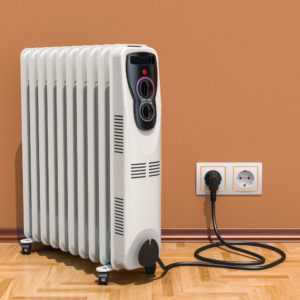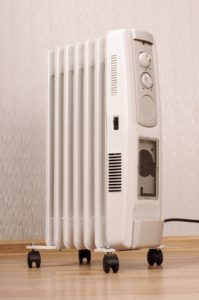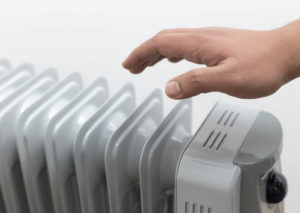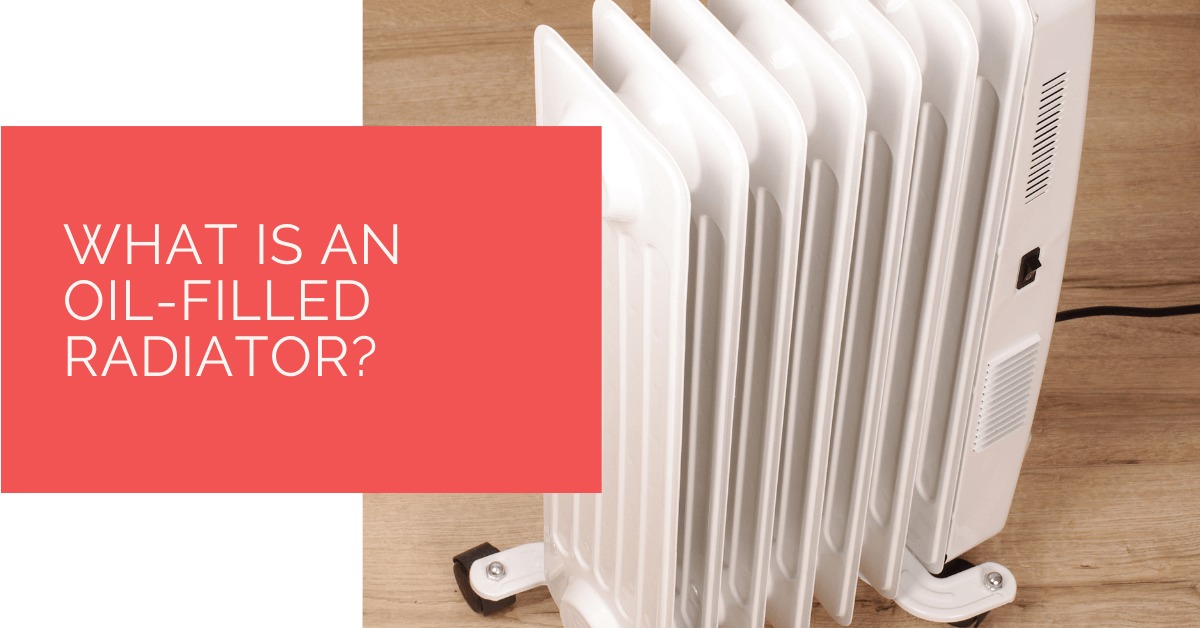People who live in areas that experience frigid temperatures know the importance of suitable oil-filled radiators. An oil-filled radiator or heater can warm up rooms quickly and very efficiently. Room heaters come in various forms, and each has its benefits.
A central heating radiator is very different from an oil-filled radiator. Both can heat a space effectively depending on the room dimensions. However, if you are sick of very high electricity usage racking up your bills, an oil-filled radiator is the perfect solution for your room.
There are many other differences between the two. You must continue reading if you are considering switching from traditional gas heating to electric oil-filled radiators. Here is everything you should know about oil-filled radiators before buying them for your home!
Contents
- 1 Key Takeaways
- 2 What Are Oil-Filled Radiators?
- 3 How Do Oil-Filled Electric Radiators Work?
- 4 How Efficient Is an Oil-Filled Heater?
- 5 What Are the Benefits of Using an Oil-Filled Radiator?
- 6 Safety features and precautions for using oil-free radiators
- 7 Heat Pump Source: Reliable Heating and Cooling Solutions
- 8 To Sum Up
Key Takeaways
- An oil-filled radiator is an energy-efficient indoor heating device that uses diathermic oil as a heat reservoir and operates on electricity, making it a safer alternative to traditional gas heaters.
- Oil-filled electric radiators heat the diathermic oil through convection, transfer heat to metal walls, and ultimately radiate warmth into the room through thermal radiation.
- Benefits of using oil-filled radiators include adjustable thermostats, programmable timers, eco-modes for energy conservation, portability with caster wheels, and silent heating without loud fans or machinery. However, users must exercise caution to prevent accidents and fires.
What Are Oil-Filled Radiators?
Oil-filled radiators are devices used for conventional heating of homes. They are generally used indoors in smaller spaces. They radiate heat to the surrounding air. The basic principle of an oil-filled radiator is air convection. It uses this heat transfer mechanism to transfer warmth to the surrounding areas.
While the name may mislead most people, oil-filled radiators require electricity too. They run on electricity and heat any room as long as it is connected to an outlet. However, as the name suggests, the radiator body is filled with oil.
The oil in the radiator body is used as a heat reservoir. The thermal oil inside does not serve any other purpose than heat retention. The oil in the radiators does not combust in any way, and the oil heaters run smoke-free.
The oil used in such radiators is diathermic. Diathermic oil is used for temperature regulation in heating devices. This oil can retain heat because of its high specific heat capacity and boiling point. This oil does not freeze in freezing temperatures either because of its shallow freezing point.

How Do Oil-Filled Electric Radiators Work?
Oil-filled radiators have a very straightforward heating process. If you are aware of the different types of heat transfer, it will become easier for you to understand how these radiators work. Their unique features make them the perfect device to heat single-zone heating.
An oil-filled electric radiator is connected to a power outlet to get electricity. Their main body is made up of metal columns filled with diathermic oil. This oil moves around in the cavities once the heating element heats it thoroughly.
The electrical element is at the bottom of the heater and heats the oil through convection. This heated liquid then moves through the columns but does not boil. The high boiling point of the oil prevents it from heating up too quickly.
The heat from this liquid inside is then transferred to the metal wall. The heat transfer from the internal heating element to the walls is done through convection. Further, this heat is transmitted through the walls with the help of conduction so that the heat reaches the outer layers of the metal walls.
After this, the wall transfers heat to the room around you. This is done with the help of thermal radiation, which keeps the air warm all around the room.
Additionally, there are many metal walls in the machine positioned like heater fins to radiate heat, increasing the surface area of the energy transfer. This is because the more the surface area more the heat will radiate outwards from the radiator.

How Efficient Is an Oil-Filled Heater?
Oil-filled heaters are a popular choice for the indoors as they are energy efficient. These heaters cost a little bit more than the oil-free radiators, and you need to take a lot of care of these devices. However, they have benefits that make them one of the best choices to heat a confined room.
An oil-free radiator or a gas radiator uses gas and combustion to release hot air. While these heaters may be warmer, using them inside an enclosed space could be very dangerous. The oil-free radiators combust and reduce the oxygen levels in any room.
After prolonged use, the oxygen content of the room will be critically low, which is very unsafe for people to be around. Oil-less heaters use electricity and heated liquid to help you achieve the desired temperature of any space like living rooms, bedrooms, etc.
When it comes to efficiency, oil-less heaters fall somewhere in the middle. While they will help you reduce your electricity bill, the cost of maintenance is a lot higher. Many space heaters come with thermostats that can help you manage the room’s temperature while not overexerting the radiator.
However, the heating fluid or the oil takes a lot of energy to heat up and stay warm. If you look for something even more cost-effective and efficient, this could be a concern. Other heating options include heat pumps, fan heaters, etc.
The efficiency of any heating device depends on the type of features you are looking for. If you want a small oil-filled radiator that heats one room quickly, you should look for a model with a broader surface area. You should also opt for a type of radiator with a thermostat control panel to maintain temperatures to make it even more energy efficient.
What Are the Benefits of Using an Oil-Filled Radiator?
Oil-filled radiators have many different varieties and types. These benefits may not be similar, but most models can provide you with these features and perks. Continue reading to find out why you should consider investing in oil-filled radiators.
Adjustable Thermostats
Most people are very particular about the temperature they wish to live in. Having a thermostat attached to your radiator helps you tune your room’s temperature to anything you like. Additionally, these thermostats also help you conserve energy.
Programmable Timers
Sometimes you only need a heated room for a few hours or before you fall asleep. Having timers on radiators help you save electricity and prevents any heat-related hazards from going down.
Eco-Modes
Many newer oil-filled heaters work so that once you switch them to eco-mode, they stop consuming as much energy. They will use lesser and lesser electricity and configure their settings to provide quality.
Caster Wheels
An oiled filled heater works best when you can make the most of its benefits by transporting it from one place to another. Having caster wheels attached to it at the bottom makes it an excellent portability option makes it a superb portability option and makes it easy to manoeuvre.
Silent Heating
These radiators do not allow heat or combustion; they use energy transfer techniques like conduction, convection, and thermal radiation. However, these oil heaters do not use fans or loud running machinery. This keeps your surroundings quieter so you can focus on what is more important!

Safety features and precautions for using oil-free radiators
One of the biggest concerns while using a heater is that if people don’t proceed with proper caution, this could quickly become a fire hazard. Oil heaters or oil-filled radiators work so that their outer surface is always boiling due to the diathermic oil.
Oil-filled radiators operate on the principle of an interconnected system of convection, conduction, and thermal radiation. So, if people end up touching this outer surface while the oil-filled heater is running, they could end up with surface burns.
Oil-filled electric heating is efficient and not as dangerous as other central heating models. It is advised not to dry clothes on the heater and prevent using it in damp rooms like your bathroom. There are chances of your heater not working at all if it is fully submerged in water.
The oil heater comes with a fuse. If this fuse fails to switch the radiator off when it trips or topples, the wire heats up on its own. The different parts of the radiator could start creating friction, leading to a fire.
Heat Pump Source: Reliable Heating and Cooling Solutions
At Heat Pump Source, we take pride in our unwavering commitment to serving the UK with top-tier HVAC solutions. From the efficiency of heat pumps and the cool relief of air conditioning to the warmth of boilers, radiators, and underfloor heating, our dedicated team is always at the forefront of innovation. We understand the unique needs of every household and business, and we strive to provide dependable health and cooling products and services that are tailored just for you. Ensuring your comfort and satisfaction is our utmost priority. Whether you have questions, need guidance, or require support, we’re always here to assist. Please don’t hesitate to contact us; we’re eager to be of service.
To Sum Up
You can count on electric heaters to help you get rid of the cooler air from your room and replace it with a warm atmosphere, so you stay warm and comfortable indoors. Before buying a column heater, you must weigh the downsides or the safety warnings. As long as you maintain all safety precautions, you should have no trouble using an oil heater for your home!
About the Author
At Heat Pump Source, our articles are the product of a collaborative effort among a team of highly skilled HVAC experts. Our dedicated professionals, hailing from diverse backgrounds in heating, ventilation, air conditioning, and refrigeration, contribute their extensive knowledge and experience to every piece of content. This multidisciplinary approach ensures comprehensive coverage. Our commitment is to deliver authoritative, reliable, and tailored advice to meet the unique needs of every household and business across the UK.

